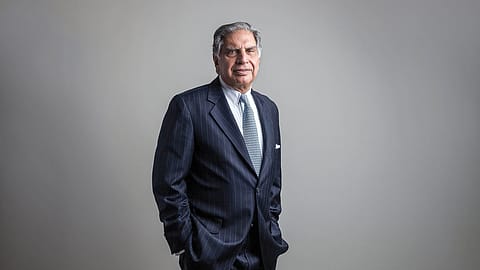Ratan Tata: Society, humanity at the heart of all businesses
Ratan Tata was one of the rarest business promoters in the country who launched businesses without analysing the cash flow projections.

Ratan Tata, who passed away on Wednesday night, leaves behind a legacy that none of his contemporary businessmen could claim. He was one of the rarest business promoters in the country who launched businesses without analysing the cash flow projections. He was more interested in keywords like social impact, emergence of India and ahead of the curve.
His idea of ₹1 lakh car failed on the business front, but it was woven around the middle class' basic requirement of a car. When Nano came out of the factory, the manufacturing cost was more than ₹1 lakh. But Tata said at the launch, "A promise is a promise".
Similarly, Tata Chemicals' foray into pulses business was essentially for supplying quality food products to consumers at affordable prices. Tata never saw the agrichemicals business of Rallis as a profit-focused business. He wanted the company to contribute to the country's food security.
It was Tata's dream to take over financially distressed Air India, which was started by his uncle JRD Tata and nationalised by Government of India. Tata, who was a licensed pilot, had an emotional connect with the Air India brand despite the fact that the turnaround of the airline was always seen as a near-impossible feat. Tata Sons bought Air India in January 2022.
The basic idea behind the expansion of Tata Consultancy Services (TCS) as a software-focused firm was to get technology at an affordable price. Affordable housing was his other focus area.
He valued relationships the most. It was Tata who insisted on settling the dispute between Tata Teleservices and its erstwhile partner NTT Docomo, paying $1.2 billion to sever the ties. The idea of shutting down the loss-making UK steel business (Corus Plc) was initially unacceptable for Tata. The job losses and the impact on the reputation of Indian business were his worries.
Tata was keen on showing the power of Indian companies to the world. During his tenure as chairman, he spearheaded many global acquisitions— Tata Tea bought Tetley, Tata Steel acquired Corus Plc, Tata Motors took over Jaguar Land Rover, Tata Power bought Indonesian coal mines, among others. Though some of the moves flopped, the courage has given confidence to other Indian businessmen to scout for opportunities abroad.
Recommended Stories
Tata wanted the companies to be ahead of their rivals in terms of implementation of new technologies and adhering to sustainability commitments. In the last 10 years, Tata was engaged in manpower skilling activities via Tata Trusts, which own two-thirds of the stock holding of Tata Sons—the group holding company. Tata was chairman of Tata Trusts — one of India's oldest and non-sectarian philanthropic organisations. "Trusts are committed to create prosperity among people and do it in a manner that makes a difference," he said in 2016.